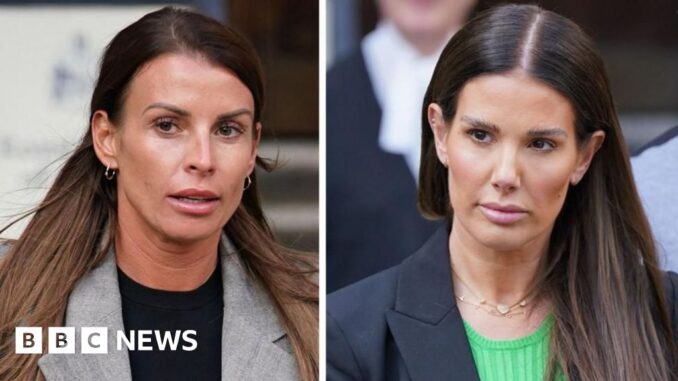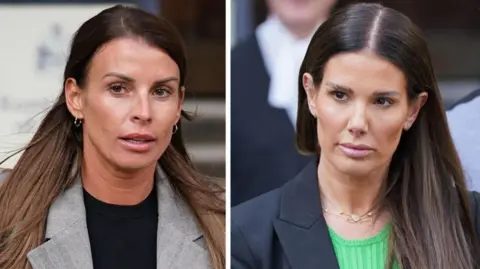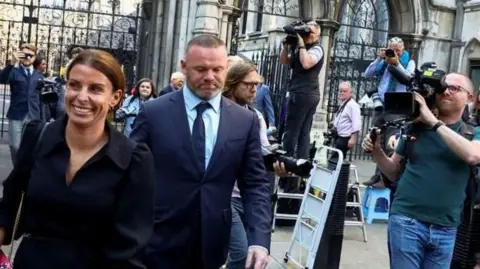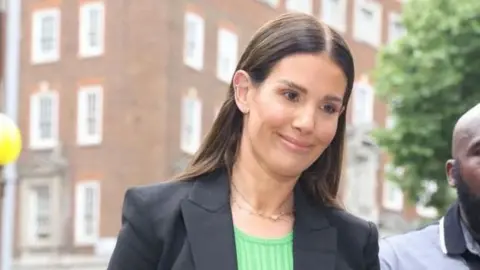
 PA Media
PA MediaA row over a luxury hotel, a mini-bar tab and two women who just cannot seem to agree.
Yes, you guessed it. Wagatha Christie is back.
The dispute between Coleen Rooney and Rebekah Vardy returned to court this week, exactly five years after the viral social media post that sparked their high-profile libel battle.
During the High Court trial in 2022, the world’s media watched on, gripped by details of a whodunit worthy of author Agatha Christie.
Rooney had accused her fellow footballer’s wife of leaking private information about her to the press, and eventually emerged victorious.
Vardy was ordered to pay 90% of her rival’s legal costs, which now stand at more than £1.8m.
This week, the showdown returned to court as Vardy tried to reduce that bill.
It’s a saga worthy of a soap opera, and one that taps into Brits’ fascination with the Wags (wives and girlfriends) of footballers. It has already spawned multiple documentaries. And it’s not over yet.
“We’ll be back again at some point next year for an excruciating line-by-line process of going through the costs,” says media lawyer Jonathan Coad, who has followed the case from the start.
“It’s ridiculous,” he adds. “It’s the last place you want to end up.”
Here is what we learned after another week of the now infamous Wagatha row.
A ‘close-run thing’
This week’s hearing was a “close-run thing”, but in the end, “the winner appears to be Coleen again”, says Coad.
Vardy’s barrister argued there were various reasons why the amount of money she has to pay should be reduced.
But in a ruling on Tuesday, senior costs judge Andrew Gordon-Saker dismissed a number of Vardy’s claims.
He found that Rooney’s legal team had not committed any misconduct, but reached that decision “on balance and, I have to say, only just”. However, that meant it was “not an appropriate case” to reduce the amount of money that Vardy should pay.
The following day, the judge ordered Vardy to pay Rooney £100,000 this month.
That is not additional to what she already owes. Vardy has already paid £800,000 so far, and the £100,000 is a further payment towards the eventual total bill.
“Vardy took a risk. It hasn’t worked, and now she’s come away paying another £100,000,” says Coad.
Neither woman showed up this time
 Reuters
ReutersIn 2022, the world’s media descended on London as Rooney and Vardy, flanked by their husbands, arrived at the High Court.
Even the US press were gripped, as they tried to make sense of why two “soccer wives” were going head-to-head.
This week, neither woman showed up, leaving their barristers to fight it out for them.
Naturally, that meant less of a media circus outside the court. And inside, where I was, there were fewer fireworks than last time.
Britain’s tabloids still had a field day, of course. The headline of the week surely goes to Metro, which dubbed the whole affair “Wagatha Thrifty”.
But the tenor of this hearing was much more muted. There was no cross-examination, and the arguments were less incendiary – although the two KCs did still have a decent fight.
Cost hearings are dry at the best of times. Even with the famous names involved, there is only so excited anyone can get about the intricate details of chargeable rates.
A stay at the five-star Nobu Hotel
 Alamy
AlamyHaving said that, there were still some juicy details.
One of the headline-grabbing claims to emerge involved a stay at a five-star hotel in London.
Vardy’s lawyer said Rooney’s total legal bill from the 2022 case included costs for a lawyer staying “at the Nobu Hotel, incurring substantial dinner and drinks charges as well as mini-bar charges”.
The hotel brand – a spin-off from the high-end Japanese restaurants – advertises itself as being “among the top luxury lifestyle hotel chains”.
But on Tuesday, Rooney’s lawyer Robin Dunne, said the spending claims were “factually inaccurate”.
“Yesterday morning, the Sun ran a front-page headline which dealt with mini-bar charges,” he said.
“It also was reported around the world, over and over again on Twitter, or X,” he said, adding that the charges had been taken as “evidence of the defendant spending wildly”.
He said a “modest” hotel had initially been booked for the lawyer.
But on the first night, there had been no wi-fi or working shower, so the lawyer transferred to the Nobu after Rooney’s agent said she could get reduced rates, he said.
A room at Nobu ordinarily costs £600 but was charged at £295, which he said was the same price as a room at a Premier Inn.
There was also a claim that £225 had been spent on a food and mini-bar tab.
But Mr Dunne insisted the mini-bar bill actually came to just £7 for two bottles of water, and said the lawyer had not eaten at the Nobu restaurant during his stay.
Use of a London-based law firm
 Getty Images
Getty ImagesVardy’s team also claimed it was “unreasonable” for Rooney to use Stewarts, a London-based law firm, and that she should have sought one near where she lived in north-west England.
But that was rejected by the judge.
“This was always going to be a high-profile case and it attracted significant press coverage both here and elsewhere,” Mr Gordon-Saker said on Tuesday.
“Defamation is still a specialist area and most of the firms who specialise in defamation are based in central London.”
He added that it was a “reasonable choice” to instruct a solicitor in central London, given the size of the claim and the “reputations at stake”.
The judge also rejected Vardy’s claim that it had been unreasonable for Rooney to consult her barrister on 30 occasions, at a cost of nearly £500,000.
He said that Vardy’s conduct – in particular destroying evidence – “adds to the complexity” and “clearly justifies rates in excess of the guidelines” for the most experienced lawyers.
But he did say less experienced lawyers should have been charged at a lower hourly rate.
The battle goes on
![A courtroom sketch during the 2022 Wagatha Christie case, featuring [L-R] Wayne and Coleen Rooney plus Rebekah and Jamie Vardy](https://ichef.bbci.co.uk/news/480/cpsprodpb/db04/live/1d610250-86ee-11ef-822c-a50726bfda2e.jpg.webp)
This battle is far from over yet.
This week’s hearing dealt with points of principle. There will now be a line-by-line assessment of costs, which will take place next spring at the earliest.
And it is still possible that Vardy will end up paying less than the estimated £1.6m she was instructed to pay, with some rulings yet to be made.
The irony is, as Coad notes, both sides will have invested even more money in this latest battle.
And the judge’s parting shot carried, perhaps, just a hint of exasperation.
“The parties need to get on with this and put it behind them.”



Be the first to comment